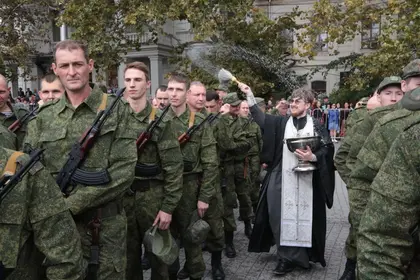Russia is preparing a new wave of mobilization of 500,000 conscripts, Vadym Skibitsky, a spokesman for Ukraine’s military intelligence, has said in a commentary for The Guardian newspaper.
This time the mobilization is expected to occur in Russia's big cities – Moscow and St Petersburg.
JOIN US ON TELEGRAM
Follow our coverage of the war on the @Kyivpost_official.
The Kremlin's plans to mobilize an additional half a million people shows that Russian President Vladimir Putin has no intention of ending the war in Ukraine.
Representative of Ukraine's military intelligence said that these mobilized conscripts would likely be used by Russia's command in offensive attempts in eastern and southern Ukraine over the spring and summer.
Skibitsky noted that it would take two months for Russia to prepare its military formations, and any success of Russia on the battlefield would depend on how well the Russians are equipped and trained. The result of the Russian new planned offensive also depends on the continued supply of Western ammunition and weapons to Ukraine.
"If Russia loses this time, then Putin will fail," Skibitsky concluded.
On Dec. 30, Defense Minister Aleksey Reznikov recorded a video address to Russians subject to military service and said that Putin's regime was going to declare martial law, close the borders and start a new wave of mobilization in early January. He urged Russian citizens to avoid mobilization.
On Sep. 21, Putin announced a partial mobilization in the country. Two weeks later, Russian regions began to report the completion of mobilization measures. Russian Defense Minister Sergei Shoigu said more than 200,000 people had arrived in the Russian Armed Forces since the mobilization started. However, the researchers note that the total of those mobilized may be higher, as there is no data on how many people have been mobilized in 32 regions of Russia.

Trump Makes 90 Day Foreign Aid Freeze – Ukraine Military Support Supposedly Untouched
The first wave of mobilization did not change the situation on the front as expected by the Russian command and generally failed. At the start of November, Russian forces were unable to hold Kherson, and were forced to retreat to the left bank of the Dnipro River. At the same time Ukrainian forces have been able to successfully repulse massive Russian attacks in the Donbas.
You can also highlight the text and press Ctrl + Enter










